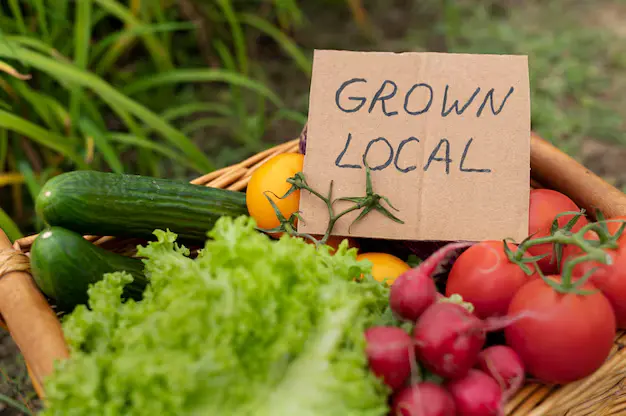
How Organic Food Supports a Healthier Environment
Eating organic food is better for the environment, and more people are eating organic food. Natural methods are used in organic farming to keep soil healthy, such as compost. This cuts down on toxic chemicals. Unlike conventional farming, organic farming does not use pesticides or fertilizers, which saves the environment and wildlife. Organic farms foster more plants and animals, which are good for nature.
Organic farming uses methods such as drip irrigation, which saves water. It also creates less pollution and can even help trap carbon in the soil, which can slow climate change. In fact, organic farming is a more sustainable way of growing food in general. Choosing organic protects the environment and ensures a healthier future for all.
Environmental Impact
Such natural pest control measures can include neem oil and companion planting. These are ecological ways. Rotating crops as well as inter cropping reduces pests and maintains healthy soil. Fewer chemicals mean cleaner water, healthier soil, and better ecosystems.

Enhanced Soil Health
Nutrient-Rich Soil
At the core of organic farming is soil health. Whereas conventional agriculture relies on chemical fertilizers for an immediate effect, organic agriculture works to establish long-term soil health. Soil quality is improved by composting, planting green manures, and cover cropping, he writes. These practices create soil that retains more water and nutrients, making it resistant to erosion and able to support more plants and animals—and eventually, biodiversity.
Prevention of Soil Erosion
In fact, one of the major issues with conventional farming is soil erosion. The chemical fertilizers and pesticides can harm topsoil so that it cannot hold moisture and nutrients. Soil depletion leading to soil erosion is tackled by organic farming. Techniques such as mulching, no-till farming, and cover crops safeguard the topsoil. Topsoil is a healthy growing medium, necessary for the growth of plants, long-term crop production, etc.
Reduced Greenhouse Gas Emissions
Lower Carbon Footprint
However, organic farming generally requires less energy than conventional farming. Because it does not employ synthetic fertilizers and pesticides, it often requires less fossil fuel. Organics such as composting, crop rotation, and agroforestry also capture carbon dioxide (CO₂) from the air, putting it back in the ground. This is helpful in slowing down climate change, acting as a carbon sink.
Sustainable Practices
Organic farming, on its part, promotes sustainability by decreasing greenhouse gas emissions through fewer inputs but also in other ways. For example, many organic farms employ renewable energy sources such as wind or solar power and adopt practices that reduce waste. In addition to having no harmful ingredients, organic farms grow their products nearby, which lessens the need for transportation and is another way they reduce the carbon impact of food distribution.
Increased Biodiversity
Supporting Wildlife
Organic farms create a healthier, more bio diverse ecosystem. There are few synthetic pesticides and fertilizers, allowing all manner of plants, insects, and animals to flourish. Such diversity is critical for a healthy ecosystem to provide natural pollination, pest control, and soil fertility. Farmers who use petrochemical fertilizers and pesticides still need to use them, and they come with their own toxicology and health issues, not least for the people who live around them, which isn’t good for the food supply chain. Healthy organic farms can also become little havens for beneficial species, like bees, butterflies, and birds, so that pollination and natural pest management can occur.

Pollinator Health
Pollinators like honeybees, bumblebees, and butterflies help many food crops reproduce. By avoiding chemicals, organic farms provide a healthier environment for these species. Because organic farming does not use harmful pesticides that kill our pollinator friends, we can be assured of better pollination and yields.
Conservation of Water in Organic Farming:
Water-Efficient Practices:
o Such as drip irrigation and mulching in order to limit water waste.
o Delivers water to the roots of plants, reducing evaporation.
o Low-cost and green, above all in areas lacking water.
- Water Pollution Prevention:
- Reduces chemical runoff from fertilizers and pesticides.
- Minimizes water contamination by using natural alternatives.
- Helps preserve freshwater ecosystems and protect aquatic life.
- Sustainable water management practices maintain clean water sources.
Promoting Sustainable Agriculture
Long-Term Environmental Health
At its most basic level, organic farming is a sustainable practice. Conventional agriculture, which too frequently overuses chemical inputs, can erode the land’s productivity over time; organic farming emphasizes practices that restore the soil and protect ecosystems. Terra firma, Crop rotation, cover crops, and the avoidance of harmful chemicals are but a few of the tools organic farmers employ to ensure that their land stays productive and healthy for generations to come.
Supporting Local Economies
Support small to medium-scale farmers: Organic farming supports local economies. It enables them to produce food in an environmentally sound and sustainable manner. The sale of organic products is less reliant on large-scale industrial farming when serving local markets. This creates more resilient systems where the community is the priority.
Frequently Asked Questions (FAQs)
-
Why are organic foods better for the environment?
The organic food has no chemical food, such as fertilizers and pesticides. This is less polluting, conserves water, and nurtures biodiversity while aiding healthy ecosystems.
-
How does organic farming help with climate change?
Organic farming reduces greenhouse gas emissions that directly help mitigate climate. This includes cutting synthetic inputs, sequestering carbon in the soil, and using renewable energy on farms.
-
How does organic farming conserve water?
Organic farming is one of the best systems of agriculture to mitigate climate change. It means reducing synthetic inputs, sequestering carbon in the soil, and powering farms with renewable energy.
-
Can organic farming reduce soil erosion?
The first of which is how we fight climate change through the reduction of greenhouse gases. It does so by reducing the use of synthetic inputs, sequestering carbon in the soil, and using renewable energy on farms.
-
What are the environmental benefits of supporting organic food?
Organic farming uses permits and pesticides free based on chemical pollution, protects water resources, and supports biodiversity. It can also decrease low greenhouse gas emissions and encourage regenerative agricultural practices that heal the soil.
-
How can I support organic farming?
Supporting organic farming by purchasing organic products Support local organic farmers and sustainable farming policy.
That is a broader explanation of the article that dives into the topic per paragraph and asks all the questions to cover the advantages of organic food for the environment. If you would like any further modifications, just let me know.





